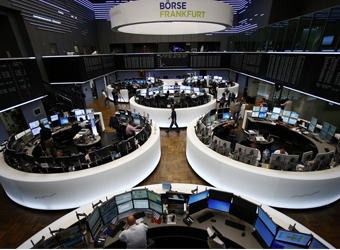European equities finished mostly higher Monday as markets in the region tried to shake off concerns surrounding tariffs and focus on the positive trading seen in individual stocks.
The pan-European STOXX 600 closed up 0.25 percent provisionally, off its session highs, while the majority of the region’s sectors ended in positive territory.
Major bourses showed a mixed picture. The U.K.’s FTSE 100 closed down 0.13 percent, the French CAC 40 ended relatively flat, up 0.04 percent, while Germany’s DAX popped 0.58 percent.
Utilities held the top spot in sectoral gains by the close following news that RWE was to sell 76.8 percent of its Innogy arm to rival E.On. Morgan Stanley said the deal could be a “win-win” decision. Innogy shares rose to the top of the STOXX 600, finishing up 12.1 percent, while RWE came in second, jumping 9.2 percent, and E.On rose 5.4 percent.
The commodities sector closed slightly lower as metal prices came under pressure, causing a number of London-listed miners to post declines.
GKN initially rose 2 percent during trade after Melrose increased its offer for the company to £8.1 billion ($11.24 billion). Shares of GKN, however, reversed gains to close down 2.5 percent while Melrose sank 5 percent — making it one of the STOXX 600’s worst performers.
In individual stocks news, shares of Aryzta slipped 2.3 percent after the company reported widening losses in the six months to January. Deutsche Bank eked out gains by the close after revealing the price range for an initial public offering of its asset management arm, which is valued at up to 7.2 billion euros ($8.86 billion), according to Reuters.
Inmarsat sank 5.3 percent after CFRA Research cut its price target on the stock. The news added pressure to telecoms, which closed lower as a sector. This comes after the company reported earnings last week.
Equities across the globe saw a strong start to the week, after the U.S. delivered a nonfarm payrolls report that surpassed analyst expectations. Last Friday, data released showed that the U.S. economy added 313,000 jobs in February, above a forecast of 200,000. Wage growth came in below expectations, rising 2.6 percent on an annualized basis.
The solid job creation numbers and lower-than-expected wage growth eased worries about the Federal Reserve’s rate hike trajectory. The central bank is due to meet next week.
During Europe’s afternoon trade, markets turned their attention to Wall Street, which showed a mixed-to-higher picture by the end of Europe’s session.
Investors in the U.S. were on edge, as concerns over a possible trade war resurfaced, after Trump implemented tariffs on certain imports. Last week, Trump signed two declarations to implement tariffs on steel and aluminum imports — Canada and Mexico, however, are exempt.
Over the weekend, Germany’s Economy Minister Brigitte Zypries denounced once again the decision from President Donald Trump, arguing it puts “the order of a free global economy at risk.” The EU is working to see its 28 countries excluded from the tariffs. Source: CNBC
Source: CNBC


